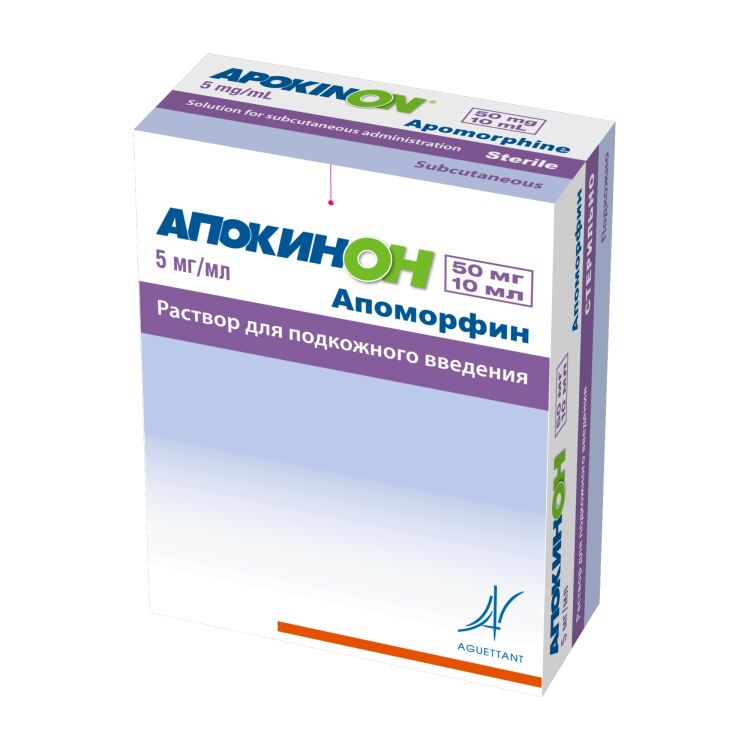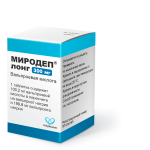Apokinon
РастворThe antiparkinsonian drug is a dopaminergic receptor agonist.

Indications
Parkinson's disease (severe course), insufficiently controlled by oral medication (presence of "on-off" phenomenon, manifested by an abrupt transition from a state of relative well-being on the background of levodopa action to immobility.
Contraindications
Hypersensitivity to apomorphine, age under 18 years, hepatic insufficiency, respiratory depression, dementia, confusion, manifestations of psychosis, the need for concomitant administration of neuroleptics with antiemetic effect, severe dyskinesia or dystonia against the background of levodopa use.
With caution
Mental disorders in the anamnesis after taking antiparkinsonian drugs; recent severe cardiovascular diseases; presence of risk of ventricular tachycardia of "pirouette" type (apomorphine, especially in high doses, may increase the risk of QT interval prolongation); marked disorders of water-electrolyte balance; tendency to nausea and vomiting.
Intermittent administration of apomorphine, in addition to continuous infusion, is not recommended for patients who have an "on" reaction to levodopa with severe dyskinesia or dystonia.
Use with special caution when initiating therapy in elderly and/or debilitated patients. Since apomorphine may cause arterial hypotension, even when used concomitantly with domperidone, caution is required when using apomorphine in patients with heart disease (especially in those with a history of postural hypotension) or in patients taking vasoactive drugs (e.g. antihypertensives).
Usage
Patients prescribed treatment with Apokinon should be able to recognise the warning signs of the "off" phase and be able to inject themselves, or have a carer able to inject them if necessary.
Treatment with apomorphine should be initiated by a specialist. The patient should be managed by a neurologist experienced in the treatment of Parkinson's disease. The patient's treatment with levodopa, alone or with other dopamine agonists, should be optimised before prescribing Apokinon.
In patients scheduled to receive apomorphine, domperidone should be administered (usually at least 2 days before Apokinon treatment). The dose of domperidone should be titrated to the minimum effective dose and cancelled as soon as possible. Before deciding to start treatment with domperidone and apomorphine, risk factors for QT interval prolongation should be carefully assessed for each patient to ensure that the benefit exceeds the risk.
Apokinon should not be administered intravenously. Ampoules in which the solution has turned green should not be used.
In patients who have shown a good response to bolus administration of Apokinon but whose overall control remains inadequate or who require frequent injections, continuous subcutaneous infusion by minipump and/or syringe pump may be used, with the dose determined as follows:
- the initial infusion rate of Apokinon is 1 mg/h (0.2 ml/h), then the infusion rate should be increased each day depending on individual response;
- the increase in infusion rate should not exceed 0.5 mg/h and the interval between infusions should be at least 4 h;
- the dose of Apokinon is tailored to the individual; however, once tailoring is completed, it remains relatively constant for each patient.
The infusion rate is usually 1-7 mg/h, and the maximum dose should not exceed 100 mg/day.
Apokinon (5 mg/ml) is intended for use in undiluted form ONLY for subcutaneous infusion (any minipump or syringe pump approved for use in Russia may be used).
The choice of the mini-pump and/or syringe pump to be used and the required infusion parameters should be determined by the physician according to the specific needs of the patient.
Basic technical requirements for the mini-pump or syringe pump used for the administration of Apokinon:
occlusion pressure
1.5 bar
infusion rate
0 to 40 mg/h (in 0.5 mg/h increments)
infusion rate accuracy
±5%
Infusion mode and infusion rate selection
manually or automatically (scheduled)
The injection site of apomorphine should be changed approximately every 12 hours due to the possible appearance of inflammatory subcutaneous nodules in patients receiving continuous infusion.
Possible injection sites are: anterior abdominal wall, sub or supra scapular region of the back, anterolateral surface of the thighs, shoulders. Apomorphine should be administered deep under the skin.
Infusion should be performed only during waking hours. If the patient does not experience serious problems during the night, 24-hour infusion is not recommended. Tolerance to therapy does not appear to occur provided that there is an untreated period of at least 4 h during the night.
The infusion site should be changed every 12 h. In some cases it is advisable to supplement continuous infusion with bolus administration.
During continuous infusion, dosage reduction of other dopamine agonists can be considered. It is usually possible to reduce their dosage; the extent of this reduction is highly variable from patient to patient, and levodopa dose adjustments should be made with caution under the supervision of an experienced physician.
Children
Apokinon is contraindicated in persons under 18 years of age.
Elderly persons
The elderly comprise the largest proportion of patients with Parkinson's disease. The management of elderly patients receiving apomorphine is not different from that of younger patients, however, special caution is recommended at the beginning of therapy in these patients due to the risk of orthostatic hypotension.
Use in renal impairment
In patients with renal impairment, no dosage regimen adjustment is required.
Have questions? Contact Us
Drugs in the category Neurology
Has contraindications. Needs specialist overview.






